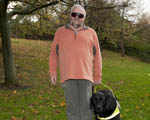 Go to main content
Go to main content
Archive Website of the UK government
Please note that this website has a UK government accesskeys system.
Main menu
Page menu
Disabled people

Air travel if you are blind or visually impaired

When you travel by air, always tell your airline, travel agent or tour operator if you'll need assistance at the airport or on the plane. Request this at least 48 hours before you fly, so that there is time to organise the support you need.
At the airport
Support services for blind or visually impaired people at airports on request include:
- someone to meet you and guide you through check-in, baggage check and customs controls
- someone to tell you personally when your plane is boarding if you are in a 'silent airport'
- someone to help you board the plane and stow any luggage
At a security search, always explain your impairment and ask airport security staff to repack bags in a specific order for you. You'll then know where essential items are located.
On the plane
The safety demonstration given by the cabin crew at the beginning of a flight should be available in other formats, such as Braille and audio. You should request this in advance if needed.
Cabin crew should:
- tell you more general information about the plane
- tell you about its services and facilities
- describe the layout of your food tray to you
- open any packaging that is awkward
- help you find your way to the toilet
Guide dogs and air travel
If you want to take your guide dog on the plane with you, always tell the airline about this in advance. The airline can ask the owner to produce proof that the dog has been trained by a recognised organisation. In the UK these organisations are members of Assistance Dogs UK.
You should also check the airline's policy on carrying guide dogs. Guide dogs should be allowed to travel free of charge, in the passenger cabin with you.
When travelling with a guide dog, you should always carry identification for yourself and the dog. You'll need a car safety harness suitable for securing the dog at take-off and landing and at any time that the airline requires it.
Pet Travel Scheme
The Pet Travel Scheme (PETS) could help you avoid long quarantine periods for your dog when you return to the UK from an international trip.
Not all airlines operate the scheme so it is best to check with them beforehand. Pets travelling on airlines under the scheme are normally carried in the hold of the plane. There is an exemption that allows guide dogs and other assistance dogs to travel in the cabin with their owners.
There is more information on the scheme in the travel and transport section of this website.
 Facebook
Facebook Twitter
Twitter StumbleUpon
StumbleUpon Delicious
Delicious Reddit
Reddit